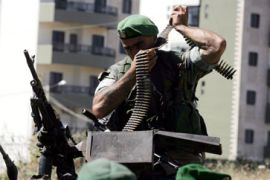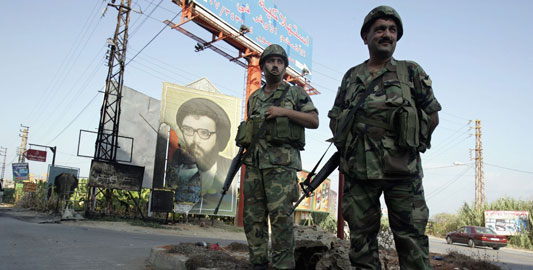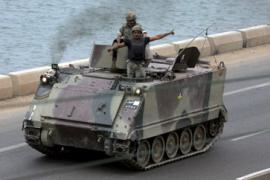US backing behind Lebanon’s army
Al Jazeera looks at Washington’s changing attitude towards providing military aid.

 |
| US assistance for the Lebanese military has increased 16-fold [GALLO/GETTY] |
One year after the Hezbollah-Israel war, Washington is adopting a more proactive stance towards Lebanon, adding military assistance to its diplomatic support for Beirut in a direct challenge to Syrian and Iranian influence in the region.
Middle East experts say the change in strategy is designed to deal with new political realities in Lebanon after the Cedar Revolution in 2005 which helped force Syria to withdraw its forces.
Previously, the US had supported Lebanese sovereignty and called for the disarming of militias in the UN Security Council, but Washington had repeatedly refused pleas for direct military assistance.
| Special report | ||||
|
In 2006, Beirut asked for, but did not receive, $800m worth of advanced weapons to bolster the Lebanese army.
Emile El Hokayem, a Middle East expert at the Washington-based think tank Henry L. Stimson centre, told Al Jazeera that the White House had always feared its advanced weaponry could end up in the hands of groups opposed to the US.
“There’s the fear that the Lebanese army might split up at one point and that this weaponry might be used by groups opposed to the US, fear that the military itself is not the most democratic institution in Lebanon, and that weaponry could be used against Israel. All these are very valid concerns,” he said.
The military confrontation between Lebanese troops and fighters from the Fatah al-Islam group in the Nahr al-Bared refugee camp, however, forced Washington to modify its approach.
El Hokayem said: “At the end of the day, the US only supported the Lebanese military when it started fighting militants in Nahr al-Bared and it looked liked the US was supporting the Lebanese army because it was fighting a cause Washington cares about: terrorism.”
Increased military aid
Over the past few months, US military assistance to Lebanon has increased 16-fold.
Congress appropriated $769.5m for Lebanon in 2007, compared to less than $50m in previous years.
|
|
More than half of the $769.5m will go to supporting Lebanon’s military, law enforcement and international peacekeepers charged with preventing Hezbollah from launching another war on Israel.
The aid package will make Lebanon the third largest recipient of US assistance per capita.
Vali Nasr, a professor at the Fletcher school of law and diplomacy at Tufts University and a senior fellow for Middle Eastern Studies at the council for foreign relations, said US aid is designed to ensure the Lebanese army does not lose face while fighting in the Palestinian refugee camp.
“The aid was to prevent the military losing faith in the battle against al-Qaeda in the Nahr al-Bared camps because if that happened then the government of Prime Minister Fouad Seniora would have fallen very easily,” he said.
However, Nasr does not believe the Lebanese army will be a significant player in the domestic political scene for a number of years, even if it continues to receive military aid.
“US military aid is not going to solve Lebanon’s political problems,” he said.
Lebanon’s political woes
Since Rafiq al-Hariri, the former prime minister, was assassinated in February 2005, the country has faced several bombings in civilian areas, killings of journalists and political figures, and a war on its southern border.
In early July, as the first anniversary of that war approached, the beleaguered Lebanese government was still trying to root out elements of the Fatah al-Islam armed group, thought to be allied with Al-Qaeda.
In June, a car bomb killed anti-Syrian parliamentarian Walid Eido and deepened fears in Washington that Syria could be seeking to reassert control after its 2005 withdrawal.
US officials hope the new military assistance package will send a clear message that Washington firmly stands behind Siniora’s government.
But Anthony Cordesman, who holds the Arleigh A. Burke chair in strategy at the centre for strategic and international studies, warned US efforts to help rebuild the Lebanese army could fail to stabilise the country.
“Similar efforts in 1982-1983 simply armed an army that divided and became part of the problem rather than the solution,” he said.
“Unwavering” support
In the meantime, the Siniora government and the opposition have reached a political impasse.
With presidential elections looming, the opposition has threatened to establish a rival government.
 |
| Lebanese troops have been battling Fatah al-Islam in the north of the country [EPA] |
If the two camps cannot agree on a national unity government or on choosing a new president, chronic instability and fragmentation of authority could lead to chaos.
Gina Abercrombie-Winstanley, the director of the US state department’s office of Egypt and Levant affairs, told Al Jazeera that US support for the current Lebanese government would be “unwavering”.
“One of the things that we feel very strongly about is that there should not be additional steps to destabilise the government which include calling for another government to be put in place at the same time as the democratically elected government,” she said.
“We will consider our options as to how better to support the democratically elected government of Lebanon.”
Power sharing
But some Middle East analysts have criticised the way the US has dealt with some of Lebanon’s political factions and say Washington should urge a framework of power sharing.
Nasr believes that in supporting the Siniora government and providing military aid but not pushing for negotiations between factions, the US will be seen as seeking to empower the government to impose its will on others.
This is a strategy that would be likely to further alienate Hezbollah.
Bruce Riedel, a Brookings Institution fellow and former adviser to George Bush, the US president, said: “The US has dealt with Hezbollah as a terrorist organisation. Hezbollah is a terrorist organisation and is also much more than that; it is the political representative of a sizeable part of the Lebanese political scene.”
“We set up a situation in which it’s very difficult to bring about any kind of political reconciliation,” he said.
In recent months US politicians and independent policy groups such as the Iraq Study Group, headed by James Baker, former US secretary of state, and Lee Hamilton, a fomer Democratic congressman, have pushed the White House to convene a regional peace conference that includes Syria and Iran.
But while the US has begun engaging in regional talks on Iraq, the thorny issue of Hezbollah and its threat to Israel have kept talks on Lebanon off the negotiating table.
And this could lead to renewed military confrontations.
Daniel Levy, a former Israeli peace negotiator and a scholar at the New America Foundation said: “When you have an armed camp and a deeply divided quality with a prospect of two governments, a parliament that has not convened … it’s extremely dangerous for the external powers to continue driving it in that direction.”
But he told Al Jazeera that he believed war could still be avoided if a regional dialogue runs concurrent with a national dialogue.
“Syria will most probably be part of that regional dialogue,” he said.
